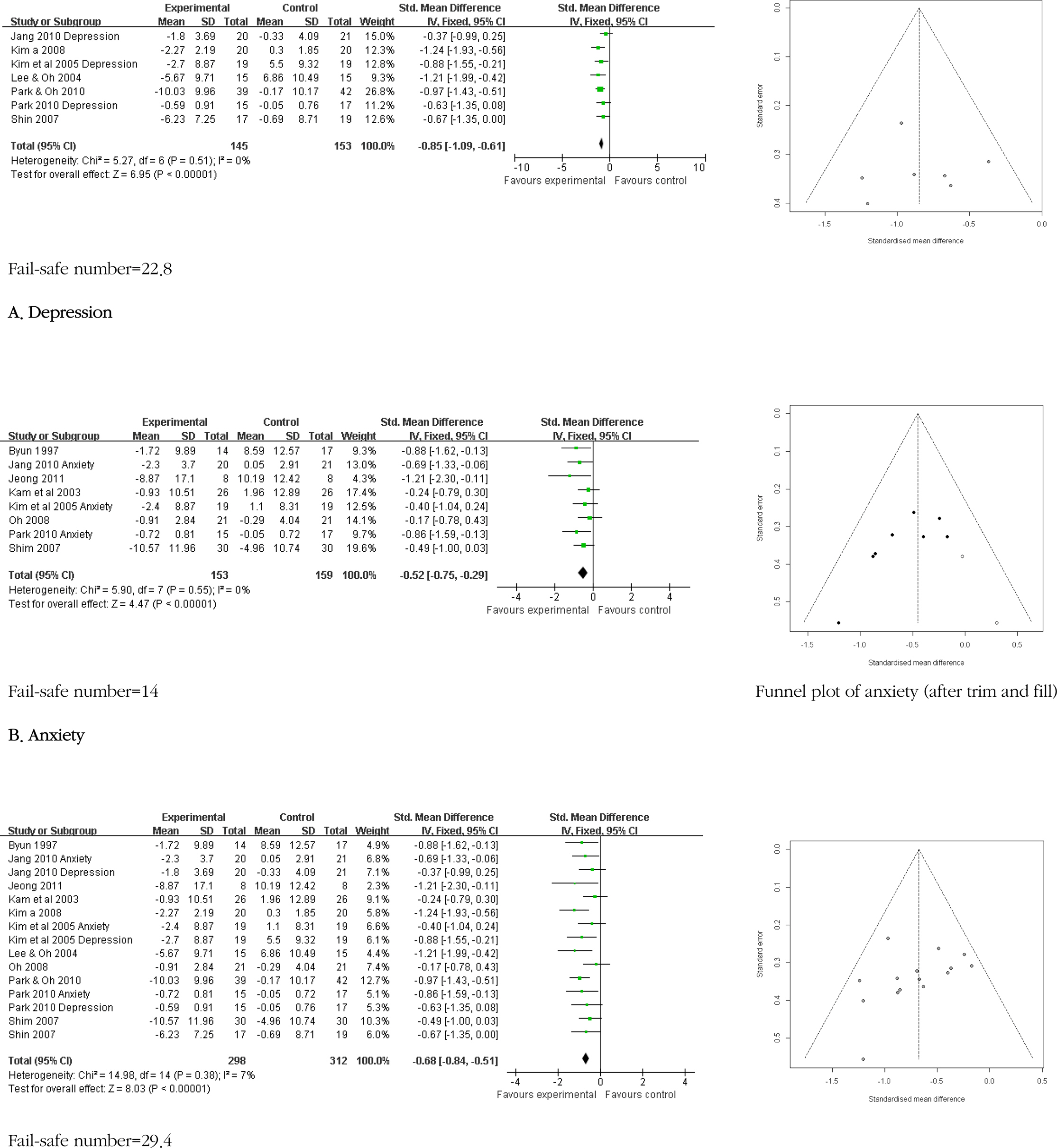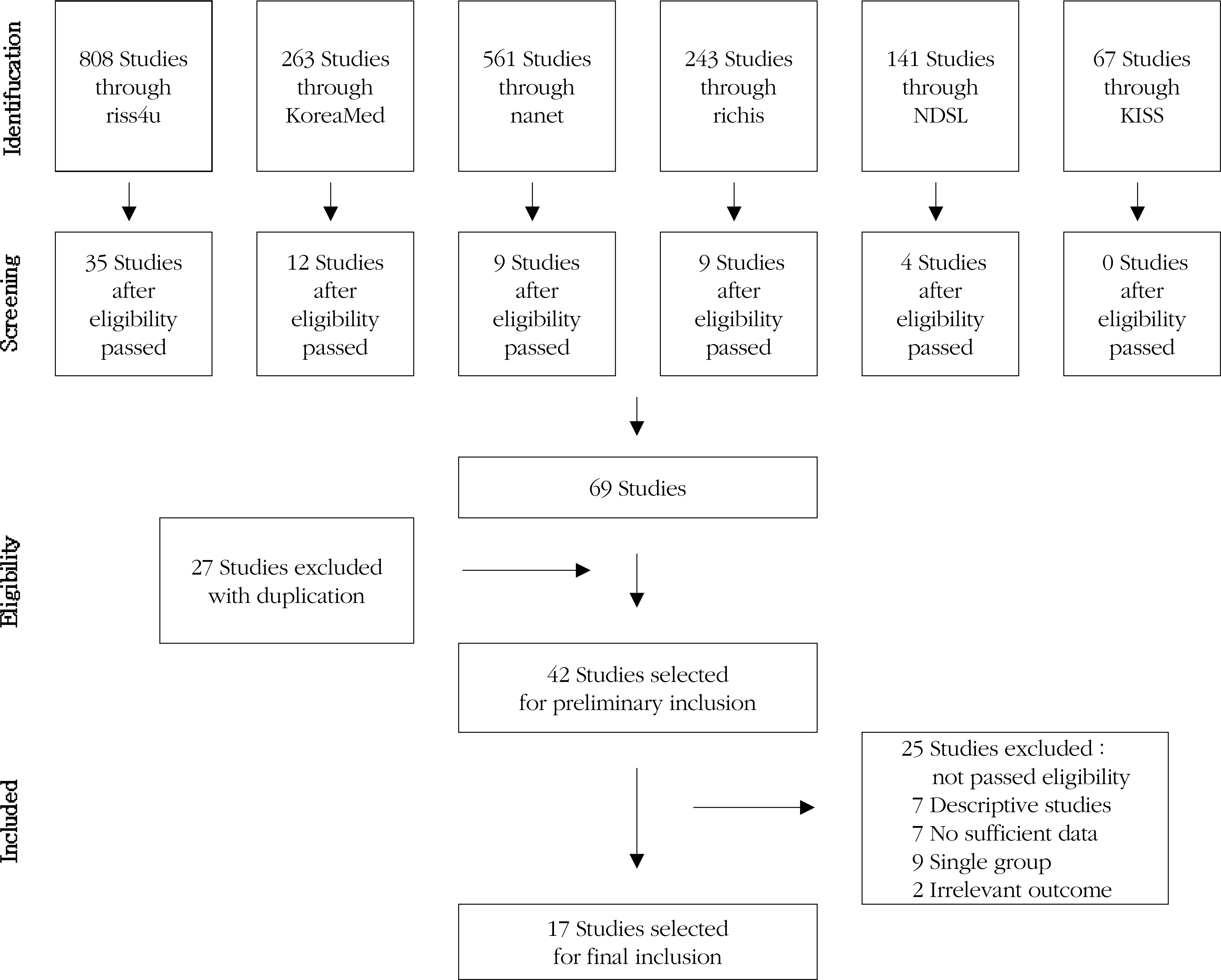1Department of Nursing, Sahmyook University, Seoul
2Department of Nursing, Graduate School, Sahmyook University, Seoul, Korea
© 2013 Korean Society of Adult Nursing
This is an Open Access article distributed under the terms of the Creative Commons Attribution Non-Commercial License (http://creativecommons.org/licenses/by-nc/3.0/) which permits unrestricted non-commercial use, distribution, and reproduction in any medium, provided the original work is properly cited.

| ID | Design | Subject (stage) | Sample size | Scale | Interventions | Source | Outcomes | Direction of effect | ||
|---|---|---|---|---|---|---|---|---|---|---|
| Exp. (n) | Con. (n) | Name/Type | Weeks/Number of Sessions /Min | |||||||
| Kam et al (2003) | NRCCT | Cancer patients | 26 | 26 | Oh et al (2007)'s scale/ STAI | Self efficacy promoting program/individual | 2/2/25 | Master's (nursing) | Self efficacy/ self care/anxiety | +/+/No diff |
| Shin (2007)† | RCT | Cancer patients (home based) | 17 | 19 | Miller's hope scale/hope index scale from nursing outcomes classification/ Zung (1965)'s depression scale | Hope intervention/ individual | 8/8/40 | Master's (nursing) | Hope/hope index/ depression | +/+/No diff |
| Tae & Youn (2006) | NRCCT | Cancer patients | 15 | 15 | Hearth (1991)'s hope scale/ Youn (1997)'s QOL scale | Forgiveness nursing intervention program/individual | 1/4/60 | Journal (nursing) | Hope/quality of life | +/+ |
| Kim et al (2008)† | RCT | Cancer patients (home based) | 20 | 20 | Nowtony (1989)'s hope scale/ Index scale from nursing outcomes classification/ Cella (1993)'s functional assessment cancer therapy- general QOL | Hope intervention/ individual | 6/6/40~60 | Journal (nursing) | Hope/hope index/ quality of life | +/+/No diff |
| Ko & Park (2011)|| | NRCCT | Breast cancer patients | 17 | 22 | Sherer's self efficacy scale/ Song's self efficacy scale/ Dodd's self care scale/ Tae's QOL scale | Self efficacy promoting program/individual and group | 4/6/21 | Journal (nursing) | General self efficacy/ specific self efficacy/ self care behavior/ quality of life | No diff/+/No diff/ No diff |
| Lee (2006)|| | NRCCT | Lung cancer patients | 12 | 16 | Jang (1996)'s QOL scale | Programs using strategies for promoting self efficacy/group | 4/4/2 | Journal (nursing) | Knowledge/ self efficacy/ quality of life | +/+/No diff |
| Lee & Oh (2004)ठ| NRCCT | Cancer patients (stage 1-2) | 15 | 15 | BDI/STAI | Guided imagery program | 1/6/15 | Journal (nursing) | Anxiety/depression | -/No diff |
| Kim a (2008) | NRCCT | Cancer patients (stage 1-3) | 20 | 20 | Yesavage (1986)'s depression scale/Oh, Song, Kim (1998)'s sleep scale | Guided imagery with visual screen/individual | 1/12/18 | Master's (nursing) | Depression/sleep | -/+ |
| Byun (1997) | NRCCT | Cancer patients (stage 1-4) | 14 | 17 | Rhodes's index of nausea and vomiting/STAI | Guided imagery program/individual | 2/11/15 | Master's (nursing) | Nausea & vomiting/ anxiety | No diff/- |
| Oh (2008)‡|| | NRCCT | Cancer patients (stage 1-4) | 21 | 21 | HADS | Spirituality/ hope promoting program/individual and group | 4/4/30~50 | Journal (nursing) | Fighting spirit/ helplessness/ anxiety/self-care | +/-/No diff/+ |
| Jeong (2011)§ | NRCCT | Cancer patients (stage 1-4) | 8 | 8 | STAI/BAI/PPI/VAS | Mindfulness-based stress reduction program/group | 8/8/90 | Master's (non- nursing) | Anxiety/pain/ blood pressure/pulse | -/-/-/- |
| Kim b (2008) | NRCCT | Gastric cancer patients | 20 | 22 | Sherer& Maddux (1982)'s self efficacy scale/Oh (1997)'s self care scale/Tae et al (2002)'s QOL scale | Web based self-efficacy promoting program/individual and group | 6/6/25 | Doctoral (nursing) | General self-efficacy/ specific self-efficacy/ self-care behavior/ body weight/BMI/ quality of life | +/+/+/-/+/+ |
| Kim et al (2005) | NRCCT | Cancer patients | 19 | 19 | STAI/BDI/Nowotny (1989)'s hope scale/Jang (1993)'s QOL scale | Guided imagery program/individual | 5/14/45 | Journal (nursing) | Anxiety/depression/ quality of life/ hope | No diff/-/No diff/+ |
| Park (2010)ठ| NRCCT | Cancer patients | 15 | 17 | Park (2006)'s mindfulness scale/Hayes et al (2004)'s AAQ;acceptance&action questionnaire-16/ Kim (2006)'s clinging scale/ SCL-90-R/EORTC QLQ-C30 | Meditation and group counseling/group | unclear/unclear /3night 4days | Journal (non-nursing) | Mindfulness/ acceptance behavior/ cling/ anxiety/ depression/hostility/ quality of life/ somatization | +/+/-/-/-/-/ No diff/ No diff |
| Shim (2007)ठ| NRCCT | Leuemia patients | 30 | 30 | VAS/STAI/Blood test | Imagery therapy/ individual | 4/12/13 | Master's (nursing) | Stress/state anxiety/ anxiety/ WBC/ ANC/ lymphocyte | -/No diff/-/-/-/+ |
| Jang (2010)∗ | RCT | Breast cancer patients | 21 | 21 | PKPCT/HADS/Fact-B | Meditation program/ group | 8/8/60 | Doctoral (nursing) | Power/Anxiety/ Depression/ quality of life | +/-/-/+ |
| Park & Oh (2010)§|| | NRCCT | Cancer patients | 39 | 42 | SCL-90-R/Nowontny (1989)'s scale/ C-QOL | Psychosocial intervention/individ ual and group | 8/8/60 | Journal (nursing) | Depression/hope/ quality of life | -/+/+ |
Exp.=experimental group; Con.=control group; diff=difference; RCT=randomized controlled trials; NRCCT=non-randomized controlled clinical trial; BDI=beck depression inventory; STAI=state-trait anxiety inventory.
∗Allocation concealment;
†Blind stated;
‡Intention-to-treat;
§<5% Attrition rate;
||Calculation of sample size.





Characteristics of Included Studies (N=17)
| ID | Design | Subject (stage) | Sample size | Scale | Interventions | Source | Outcomes | Direction of effect | ||
|---|---|---|---|---|---|---|---|---|---|---|
| Exp. (n) | Con. (n) | Name/Type | Weeks/Number of Sessions /Min | |||||||
| Kam et al (2003) | NRCCT | Cancer patients | 26 | 26 | Oh et al (2007)'s scale/ STAI | Self efficacy promoting program/individual | 2/2/25 | Master's (nursing) | Self efficacy/ self care/anxiety | +/+/No diff |
| Shin (2007) |
RCT | Cancer patients (home based) | 17 | 19 | Miller's hope scale/hope index scale from nursing outcomes classification/ Zung (1965)'s depression scale | Hope intervention/ individual | 8/8/40 | Master's (nursing) | Hope/hope index/ depression | +/+/No diff |
| Tae & Youn (2006) | NRCCT | Cancer patients | 15 | 15 | Hearth (1991)'s hope scale/ Youn (1997)'s QOL scale | Forgiveness nursing intervention program/individual | 1/4/60 | Journal (nursing) | Hope/quality of life | +/+ |
| Kim et al (2008) |
RCT | Cancer patients (home based) | 20 | 20 | Nowtony (1989)'s hope scale/ Index scale from nursing outcomes classification/ Cella (1993)'s functional assessment cancer therapy- general QOL | Hope intervention/ individual | 6/6/40~60 | Journal (nursing) | Hope/hope index/ quality of life | +/+/No diff |
| Ko & Park (2011) |
NRCCT | Breast cancer patients | 17 | 22 | Sherer's self efficacy scale/ Song's self efficacy scale/ Dodd's self care scale/ Tae's QOL scale | Self efficacy promoting program/individual and group | 4/6/21 | Journal (nursing) | General self efficacy/ specific self efficacy/ self care behavior/ quality of life | No diff/+/No diff/ No diff |
| Lee (2006) |
NRCCT | Lung cancer patients | 12 | 16 | Jang (1996)'s QOL scale | Programs using strategies for promoting self efficacy/group | 4/4/2 | Journal (nursing) | Knowledge/ self efficacy/ quality of life | +/+/No diff |
| Lee & Oh (2004)ठ| NRCCT | Cancer patients (stage 1-2) | 15 | 15 | BDI/STAI | Guided imagery program | 1/6/15 | Journal (nursing) | Anxiety/depression | -/No diff |
| Kim a (2008) | NRCCT | Cancer patients (stage 1-3) | 20 | 20 | Yesavage (1986)'s depression scale/Oh, Song, Kim (1998)'s sleep scale | Guided imagery with visual screen/individual | 1/12/18 | Master's (nursing) | Depression/sleep | -/+ |
| Byun (1997) | NRCCT | Cancer patients (stage 1-4) | 14 | 17 | Rhodes's index of nausea and vomiting/STAI | Guided imagery program/individual | 2/11/15 | Master's (nursing) | Nausea & vomiting/ anxiety | No diff/- |
| Oh (2008)‡|| | NRCCT | Cancer patients (stage 1-4) | 21 | 21 | HADS | Spirituality/ hope promoting program/individual and group | 4/4/30~50 | Journal (nursing) | Fighting spirit/ helplessness/ anxiety/self-care | +/-/No diff/+ |
| Jeong (2011) |
NRCCT | Cancer patients (stage 1-4) | 8 | 8 | STAI/BAI/PPI/VAS | Mindfulness-based stress reduction program/group | 8/8/90 | Master's (non- nursing) | Anxiety/pain/ blood pressure/pulse | -/-/-/- |
| Kim b (2008) | NRCCT | Gastric cancer patients | 20 | 22 | Sherer& Maddux (1982)'s self efficacy scale/Oh (1997)'s self care scale/Tae et al (2002)'s QOL scale | Web based self-efficacy promoting program/individual and group | 6/6/25 | Doctoral (nursing) | General self-efficacy/ specific self-efficacy/ self-care behavior/ body weight/BMI/ quality of life | +/+/+/-/+/+ |
| Kim et al (2005) | NRCCT | Cancer patients | 19 | 19 | STAI/BDI/Nowotny (1989)'s hope scale/Jang (1993)'s QOL scale | Guided imagery program/individual | 5/14/45 | Journal (nursing) | Anxiety/depression/ quality of life/ hope | No diff/-/No diff/+ |
| Park (2010)ठ| NRCCT | Cancer patients | 15 | 17 | Park (2006)'s mindfulness scale/Hayes et al (2004)'s AAQ;acceptance&action questionnaire-16/ Kim (2006)'s clinging scale/ SCL-90-R/EORTC QLQ-C30 | Meditation and group counseling/group | unclear/unclear /3night 4days | Journal (non-nursing) | Mindfulness/ acceptance behavior/ cling/ anxiety/ depression/hostility/ quality of life/ somatization | +/+/-/-/-/-/ No diff/ No diff |
| Shim (2007)ठ| NRCCT | Leuemia patients | 30 | 30 | VAS/STAI/Blood test | Imagery therapy/ individual | 4/12/13 | Master's (nursing) | Stress/state anxiety/ anxiety/ WBC/ ANC/ lymphocyte | -/No diff/-/-/-/+ |
| Jang (2010)∗ | RCT | Breast cancer patients | 21 | 21 | PKPCT/HADS/Fact-B | Meditation program/ group | 8/8/60 | Doctoral (nursing) | Power/Anxiety/ Depression/ quality of life | +/-/-/+ |
| Park & Oh (2010)§|| | NRCCT | Cancer patients | 39 | 42 | SCL-90-R/Nowontny (1989)'s scale/ C-QOL | Psychosocial intervention/individ ual and group | 8/8/60 | Journal (nursing) | Depression/hope/ quality of life | -/+/+ |
Exp.=experimental group; Con.=control group; diff=difference; RCT=randomized controlled trials; NRCCT=non-randomized controlled clinical trial; BDI=beck depression inventory; STAI=state-trait anxiety inventory.
∗Allocation concealment;
†Blind stated;
‡Intention-to-treat;
§<5% Attrition rate;
||Calculation of sample size.
Exp.=experimental group; Con.=control group; diff=difference; RCT=randomized controlled trials; NRCCT=non-randomized controlled clinical trial; BDI=beck depression inventory; STAI=state-trait anxiety inventory. Allocation concealment; Blind stated; Intention-to-treat; <5% Attrition rate; Calculation of sample size.